
The green racket-tail is an endemic parrot of the Philippines where it is found on Luzon and Marinduque. This species was once common, but is rapidly declining and is currently classified as endangered due to lowland deforestation and capture for cage-bird trade. The population is now estimated to be just 1,000 - 2,499 mature individuals and is continuing to decline with many local extinctions in its former range.

The genus Prioniturus, commonly known as racket-tails, contains nine parrot species found in the Philippines and Indonesia. They are easily distinguished from all other parrots by their elongated central tail feathers with the bare shaft and spatula at the end.

Psittaculini is a tribe of parrots of the family Psittaculidae. The subdivisions within the tribe are controversial.
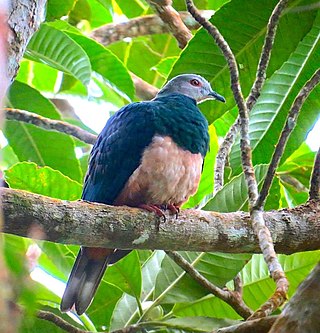
The pink-bellied imperial pigeon, also known as the zone-tailed pigeon, is found in the Philippines. It is a large and striking dove reaching sizes of up to 42cm long. The pink-bellied imperial pigeon is mostly dark green, with a pale gray head, an appropriately pink belly, and a brown, black, and gray pattern on its tail. Its eyes and eye ceres are red. Its natural habitat is tropical moist lowland forest. It is threatened by habitat loss.

The blue-backed parrot, also known as Müller's parrot and Burbridge's parrot is a large, endangered species of parrot endemic to the Philippines. It is found in tropical moist lowland forest but is now feared locally extinct in a large part of its range including Negros, Panay, Leyte, Luzon and Polilio. The only recent records are in Samar, Mindanao and Tawi-tawi. Flocks are small and often active at night. Its main threats are habitat loss and trapping for the pet trade.
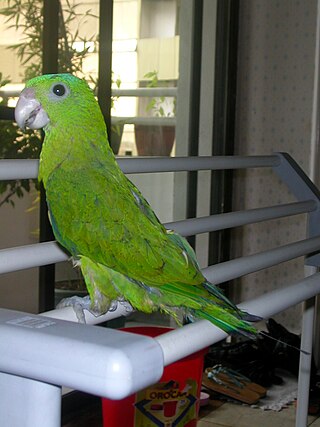
The blue-crowned racket-tail is a parrot found endemic to the Philippines. It is 27cm, basically green with a blue crown, bluish undertail, whitish beak, and dark underwings with green coverts. It was formerly conspecific with, Mindoro racket-tail and Blue-headed racket-tail
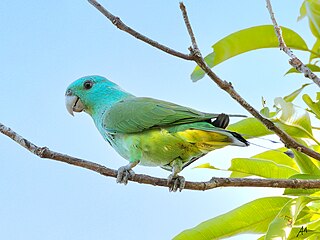
The blue-headed racket-tail, also known as the Palawan racket-tail and locally as kinawihan, is a parrot found in the western Philippines around Palawan. The species was formerly considered conspecific with the blue-crowned racket-tail. It is locally known as 'kilit'. It inhabits humid lowland forest in small flocks. It is threatened by habitat destruction and limited trapping for the cage-bird trade.

The blue-naped parrot, also known as the blue-crowned green parrot, Luzon parrot, the Philippine green parrot, and locally known as pikoy, is a parrot native throughout the Philippines and the Talaud Islands of Indonesia. It is threatened by habitat loss and trapping for the pet trade.

The yellow-breasted racket-tail is a species of parrot in the family Psittaculidae. It is endemic to Indonesia where it is found in Sulawesi's northern peninsula and the Togian Islands in the Gulf of Tomini. Its natural habitat is subtropical or tropical moist lowland forests.

The Buru racket-tail, is a species of parrot in the family Psittaculidae. It is endemic to the forest on the island of Buru, one of the Maluku Islands of Indonesia.

The golden-mantled racket-tail is a species of parrot in the family Psittaculidae. It is endemic to Indonesia. Its natural habitats are subtropical or tropical moist lowland forest and subtropical or tropical moist montane forest up to an altitude of about 3,000 metres (9,800 ft).

The blue-winged racket-tail or Sulu racquet-tail is a species of parrot in the family Psittaculidae. It is endemic to Tawi-Tawi island in the Philippines and is one of the most endangered parrots in the world. It is threatened by habitat loss and the poaching for the cage-bird trade.
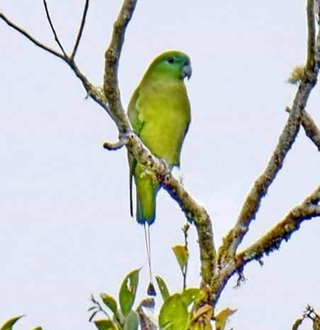
The Mindanao racket-tail is a species of parrot in the family Psittaculidae. It is endemic to Mindanao in the Philippines. It was previously conspecific with the Luzon Racket-tail. Two subspecies are recognized: the nominate waterstradti in the south-east, and malindangensis in the west. Its natural habitat is tropical moist montane forests. It is becoming rare due to habitat loss and trapping for the pet trade.

The flame-breasted fruit dove is a species of bird in the family Columbidae. It is endemic to the Philippines where it is only found in the mountains of Luzon. It is the largest fruit dove in the country and rivals the size of Imperial pigeons. It is identified with its red hood, black wings with a red patch on its secondaries and its unmistakable flame-coloured breast. Its natural habitats are in upper areas of the tropical moist lowland forest and in mid to upper montane forest. It is threatened by habitat loss, poaching for the pet trade and hunting for food.

The cream-breasted fruit dove or cream-bellied fruit dove is a species of bird in the family Columbidae. It is a large and primarily greenish dove with a distinctive red wing patch and cream coloured breast which it was named after. It is endemic to the Philippines found only on the islands of Luzon, Catanduanes and Polillo Islands. Its natural habitat is tropical moist lowland to montane forests of up to 1,300 masl. It is threatened by habitat loss, and trapping for the pet trade.

The blue-capped kingfisher, also known as Hombron's kingfisher, is a species of bird in the family Alcedinidae endemic to the Philippines and found only on Mindanao. It is one of the most colorful kingfishers in the country having a dark blue cap and wings with rufous spots, a striped rufous belly, white chin and red bill. Its natural habitats are on the upper ranges of tropical moist lowland forest and tropical moist montane forests. It is threatened by habitat loss.

The yellow-crowned flowerpecker is a species of bird in the family Dicaeidae. It is endemic to Luzon Island in the Philippines. The flame-crowned flowerpecker, which is endemic to Mindanao, was formerly considered conspecific. Its natural habitat is tropical moist montane forest. It is becoming rare due to habitat loss.

The whiskered pitta is a rare species of bird in the family Pittidae. It is endemic to Luzon in the Philippines. Along with the, Azure-breasted pitta, it is one of two endemic pittas in the country.This bird is the largest pitta in the country reaching 23 cm long and 116 g in mass. It has a brownish head, blue breast, and red belly. It has broad ash malar or "whiskers". Its natural habitat is tropical moist lowland forest and tropical moist montane forest. It is threatened by habitat loss and trapping. It is one of the most sought after birds by birdwatchers in the Philippines.
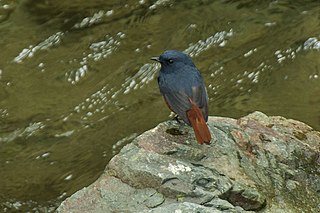
The Luzon water redstart, also known as the Luzon redstart, is a species of bird in the family Muscicapidae. It is endemic to the Philippines found primarily on Luzon with no records in Mindoro since 1965. Its natural habitats are tropical moist lowland forest, subtropical or tropical moist montane forest, and rivers. It is threatened by habitat loss.

The Mindoro racket-tail is a species of parrot in the Psittaculinae family. It was formerly considered conspecific with the blue-crowned racket-tail. It is endemic to the island of Mindoro in the Philippines and it occurs in tropical moist lowland forest. It is threatened by habitat loss and trapping for the cage-bird trade.





















